Looking for a durable and stylish addition to your kitchen or workshop? Look no further than the leather apron. With its timeless appeal and practical functionality, the leather apron has become a must-have accessory for both professionals and hobbyists alike. But what makes a leather apron so special? In this comprehensive guide, we will delve into all you need to know about leather aprons, from their history and craftsmanship to their versatile uses and benefits. Discover why leather aprons have stood the test of time and continue to be the go-to choice for those seeking protection, comfort, and style. Whether you’re a chef, a barista, a woodworker, or simply someone who loves to experiment in the kitchen, the leather apron is sure to become your trusty companion. So, let’s dive in and explore the world of leather aprons together!
Why Use a Leather Apron

Leather aprons offer a range of benefits that make them a popular choice for various industries and activities. Whether you’re working in the kitchen, handling sharp tools, or dealing with heat, a leather apron provides the necessary protection while adding a touch of sophistication to your attire.
1. Stains
One of the main advantages of a leather apron is its ability to resist stains. Whether you’re a professional chef dealing with spills and splatters in the kitchen or a hobbyist experimenting with paints and dyes, a leather apron will keep your clothes clean and protected. The natural oils present in leather make it resistant to liquid absorption, allowing spills to be easily wiped off without leaving a mark.
2. Heat
Leather is a natural insulator, making it an excellent choice for protection against heat. Whether you’re working in a bustling kitchen or handling hot metal in a workshop, a leather apron will shield your body from burns and discomfort. The thick and durable nature of leather provides a barrier between you and the heat source, allowing you to focus on your work without worrying about potential injuries.
3. Sharp Tools
For craftsmen and artisans, working with sharp tools is a regular part of their job. A leather apron provides an extra layer of protection against accidental cuts and abrasions. The sturdy and thick leather material acts as a shield, preventing sharp objects from piercing through and causing harm. Whether you’re a blacksmith, woodworker, or welder, a leather apron is an essential accessory that ensures both safety and style.
Who Wears a Leather Apron?
Leather aprons are not limited to a specific profession or trade. They are worn by a diverse range of individuals across various industries, all benefiting from the practicality and style that a leather apron offers. Let’s explore some of the professions that commonly adorn leather aprons:
1- Chefs

In the fast-paced and demanding culinary world, chefs stand as the magicians behind the scenes, crafting delectable delights that tantalize our taste buds and leave us craving for more. Beyond their culinary prowess, chefs are known for their distinctive and stylish attire, with one iconic piece that sets them apart: the leather apron. These aprons not only serve practical purposes in the kitchen but also carry significant symbolism, representing professionalism, sophistication, and a passion for their craft.
Leather aprons have a long history and have evolved from being mere protective garments into fashion statements. Traditionally, aprons were used to shield clothing from stains and heat during food preparation. With the rise of the culinary industry’s prominence and the emergence of celebrity chefs, the need for fashionable and functional attire became apparent. As a result, leather aprons made their way into kitchens, elevating the chef’s image and creating an aura of refinement.
One of the primary reasons why chefs prefer leather aprons is their durability. Leather is a robust and resilient material that can withstand the rigors of the kitchen, protecting against spills, splatters, and accidental burns. Moreover, as leather ages, it develops a unique patina, giving each apron a distinct character that reflects the chef’s journey and experiences.
Beyond their utilitarian function, the Leather Chef Apron possesses an inherent charm that adds to the chef’s aura. The rich, supple texture of leather exudes a timeless elegance, making the wearer appear suave and distinguished. As chefs move around the kitchen with precision and grace, the leather apron gracefully complements their movements, giving them an air of sophistication. The symbolism associated with leather aprons is another reason why chefs gravitate towards them. Donning a leather apron signifies a commitment to excellence and a respect for culinary traditions. It speaks to the passion and dedication chefs have for their craft, as they embrace the culinary arts with reverence, much like artisans in other disciplines.
2- Bartenders

In the bustling world of bartending, where flair, skill, and precision are the order of the day, a bartender’s attire serves not only as a uniform but also as a practical and stylish statement. Among the various garments bartenders choose, the leather apron stands out as a versatile and valuable addition to their ensemble. With its combination of functionality and flair, a leather apron proves to be the ideal companion for bartenders working in fast-paced environments.
The Bar Leather Apron offers invaluable protection to bartenders’ clothing. Behind the bar, spills and splashes are inevitable, especially when concocting complex cocktails or serving a bustling crowd. The durability and water-resistant nature of leather shield the bartender’s clothes from potential stains, ensuring that they maintain a professional appearance throughout their shift. This protection not only helps bartenders present themselves well to customers but also saves them the trouble of constantly changing outfits, allowing them to focus on delivering excellent service. Moreover, leather aprons provide bartenders with a practical solution for carrying essential tools of the trade. Within the pockets and pouches of the apron, bartenders can conveniently store bar tools like bottle openers, corkscrews, strainers, and pens, ensuring quick access and efficiency during service. This organized approach not only enhances the bartender’s workflow but also showcases their preparedness and attention to detail.
 3- Barbers
3- Barbers
Barbers, highly regarded for their precision and attention to detail, have long been esteemed professionals in the art of hair grooming. Their commitment to delivering exceptional service is complemented by a distinct sartorial choice: the leather apron. This utilitarian garment serves not only as a symbol of their craft but also as a practical tool to protect their clothing from the inevitable onslaught of hair clippings and grooming products.
The Leather Barber apron has stood the test of time as an essential aspect of a barber’s uniform. The use of leather in this context can be traced back to historical barbershops, where the material’s durability and strength made it the ideal choice for protecting against the demands of the trade. Its rugged nature ensures that these aprons can withstand the rigors of daily barbering, providing a long-lasting solution for the professionals who rely on them.
In addition to being hardy, leather aprons are also lauded for their ease of maintenance. Barbers often work in a fast-paced environment, attending to a steady stream of clients throughout the day. This leaves little time for cumbersome garment care. The leather’s inherent resistance to stains and spills allows barbers to focus entirely on their work, without the constant worry of their attire getting soiled.
 4- Welders
4- WeldersWelding is a vital yet hazardous profession that demands rigorous safety measures to protect the welders from potential dangers. Among the essential safety gear used by welders, the leather apron stands out as a critical piece of equipment. Its ability to provide protection against sparks, heat, and potential burns has made it a staple in the welding industry, ensuring the safety and well-being of these skilled professionals.
The act of welding involves joining metal pieces together using intense heat, generated by an electric arc or an oxy-fuel torch. During the process, molten metal and sparks are produced, creating a hazardous environment for the welder. Without adequate protection, the welder’s clothing and skin are at risk of coming into contact with these hot materials, leading to severe burns and injuries.
The Leather Welding apron offers a durable and fire-resistant solution to safeguard welders from these risks. The thickness of leather provides an effective barrier against sparks and molten metal splatter, preventing them from reaching the welder’s clothing and skin. This significantly reduces the likelihood of burns and injuries, allowing the welder to work with confidence and focus on their task at hand.
Moreover, leather is a naturally fire-resistant material, making it particularly well-suited for welding applications. Unlike other fabrics that may catch fire or melt when exposed to high temperatures, leather remains relatively stable and provides a reliable shield against heat and flames. This is crucial in preventing potential accidents and ensuring the welder’s safety throughout their work.
The design of welding aprons also contributes to their effectiveness. Typically, they are designed to cover a large portion of the body, extending from the chest to the knees or even lower. This extensive coverage ensures that vulnerable areas are adequately protected, reducing the risk of accidental burns to a minimum.
5- Blacksmiths
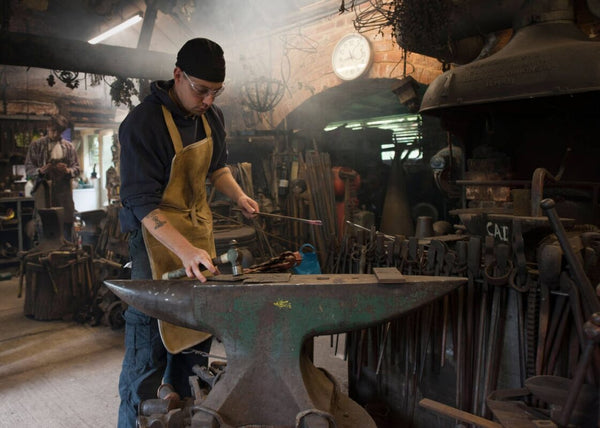
Blacksmithing, an ancient and noble craft, involves the manipulation of metal through intense heat and the skilled use of heavy machinery. In this demanding profession, the blacksmith’s safety is paramount, and leather aprons play a crucial role in providing protection against the numerous hazards they encounter during their work. The rugged yet stylish appearance of these aprons perfectly aligns with the traditional and robust nature of blacksmithing, making them a staple in the blacksmith’s attire.
The Blacksmith leather apron offers durability and longevity, making them well-suited for the demanding conditions of a blacksmith’s workshop. The rugged material can withstand the wear and tear associated with the blacksmith’s daily work, ensuring the apron remains a reliable and enduring piece of protective gear.
Working with intense heat is an inherent part of blacksmithing, as metals must be heated to malleable temperatures to be shaped and forged effectively. However, this process also exposes the blacksmith to the risk of burns and other heat-related injuries. Leather aprons serve as an essential barrier between the blacksmith and the hot metal, shielding their body from direct contact with molten metal and sparks. The thickness and fire-resistant properties of leather provide reliable protection, reducing the risk of burns and ensuring the blacksmith can work with confidence and focus.
Beyond their practical benefits, leather aprons add a touch of style and tradition to the blacksmith’s attire. Blacksmithing is an age-old craft with a long history, and leather aprons have been a part of this tradition for centuries. The rugged appearance of leather resonates with the hardworking and robust nature of blacksmithing, symbolizing the grit and determination required to excel in this trade. The apron’s connection to the craft’s heritage also fosters a sense of pride and respect for the blacksmith’s artistry and the long line of skilled craftsmen who came before.
6- Woodworkers & Carpenters
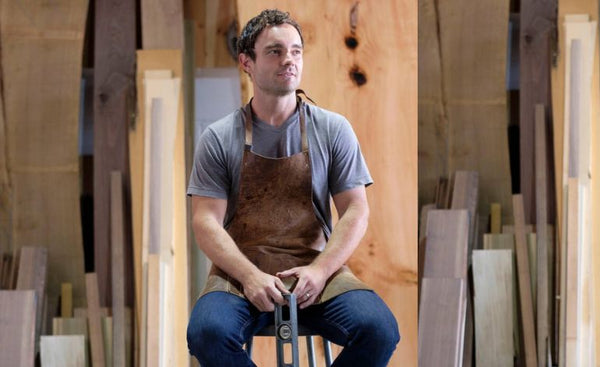
Woodworking, a timeless craft that combines artistry and craftsmanship, demands precision and meticulous attention to detail. In this hands-on profession, woodworkers rely on the protection and practicality offered by leather aprons. Beyond shielding them from potential cuts and abrasions, these aprons also serve as a convenient storage solution for essential tools and accessories, while the inherent durability of leather ensures they can withstand the demands of the woodworking environment.
The Woodworking Leather apron offers a practical advantage in the woodworking setting. Many leather aprons come equipped with various pockets and tool loops, creating a convenient and easily accessible storage space for essential tools and accessories. Woodworkers can keep their most frequently used tools close at hand, streamlining their workflow and saving time as they work on intricate projects. Having tools readily available in the apron’s pockets ensures that woodworkers can maintain their rhythm and efficiency without having to pause and search for tools elsewhere. Woodworking involves handling sharp tools, such as chisels, saws, and carving knives, which present the risk of cuts and abrasions. A leather apron acts as a reliable barrier, providing a protective layer between the woodworker’s body and these potentially hazardous tools. The thickness of the leather effectively guards against accidental contact with sharp edges, reducing the risk of injuries during the woodworking process. By wearing a leather apron, woodworkers can work with confidence and focus on their intricate tasks, knowing that their safety is assured.
7- Workers
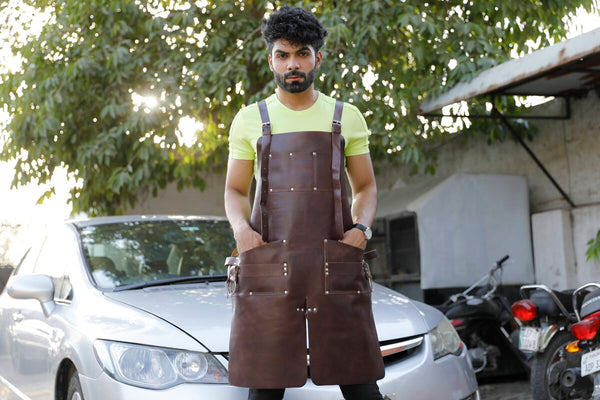
Workers wearing leather work aprons is a common sight across various industries and professions. These aprons serve as versatile and indispensable protective gear, providing a range of benefits that enhance safety, convenience, and functionality for workers in their respective roles. One of the primary reasons workers opt for leather work aprons is their exceptional ability to protect against a wide array of workplace hazards. In industries like construction, manufacturing, welding, and carpentry, workers are exposed to potential risks such as flying debris, sparks, chemicals, and sharp objects. The rugged and fire-resistant nature of leather makes it an ideal material for shielding the body from these dangers. Leather aprons act as a reliable barrier, reducing the likelihood of injuries and accidents, and allowing workers to carry out their tasks with confidence and peace of mind.
The leather work apron is designed with practicality in mind. They often feature multiple pockets, tool loops, and adjustable straps, creating convenient storage spaces for essential tools and equipment. Workers can keep their most frequently used tools within reach, promoting efficiency and productivity on the job. Whether it’s carpenters carrying measuring tapes and pencils, or mechanics storing wrenches and screwdrivers, the apron’s organization capabilities streamline workflows and save valuable time
8- Butchers
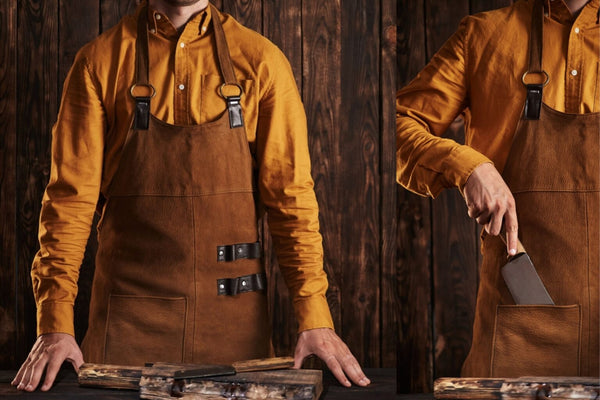
Butchers wearing leather butcher aprons is a common and practical sight in meat processing establishments. This specialized protective garment is a crucial part of a butcher’s attire, providing a range of benefits that are essential for their demanding and precision-driven profession. Butchering is a skilled craft that involves cutting and preparing meat products for sale or consumption. It requires precision, attention to detail, and the use of sharp tools such as knives and cleavers. The inherent durability and thickness of leather make it an ideal material for a butcher apron. It acts as a reliable shield, protecting the butcher’s body from potential cuts, nicks, and abrasions that can occur during the rigorous meat preparation process. The apron’s ability to withstand the wear and tear of daily use ensures that the butcher remains safe and can focus on the delicate tasks at hand.
Beyond the protective aspect, butcher leather apron is known for their easy maintenance. Butchers often work with raw meat, which can result in spills and stains. Leather’s natural resistance to fluids and its ease of cleaning make it a practical choice for this messy environment. The apron can be quickly wiped down or cleaned, allowing the butcher to maintain a professional appearance throughout their workday.
Leather butcher aprons also serve as a hygienic barrier between the butcher and the meat. As butchers handle raw meat, it’s essential to maintain a high level of cleanliness and prevent cross-contamination. The leather material is less porous than other fabrics, reducing the risk of absorption and bacterial growth, which ensures a safer food handling process.
How to Wear a Leather Apron?
Wearing a leather apron is not just about functionality; it’s also about style. Here are some tips on how to wear a leather apron with confidence and flair:
Adjust the Straps: Start by adjusting the straps of the apron to ensure a comfortable and secure fit. The straps should be snug but not too tight, allowing for ease of movement while providing adequate coverage and protection.
Tie a Knot or Bow: Depending on the design of the apron straps, tie a knot or a bow at the back to secure the apron in place. This not only adds a touch of elegance to your appearance but also prevents the apron from slipping or coming undone during your work.
Embrace the Patina: Over time, leather aprons develop a unique patina that adds character and charm. Embrace the natural aging process of your apron and allow it to tell the story of your craft. A well-worn and aged leather apron exudes authenticity and showcases the dedication and hard work put into your craft.
Personalize with Embroidery: To make your leather apron truly your own, consider adding custom embroidery. Whether it’s your name, logo, or a meaningful symbol, embroidery adds a personal touch and sets your apron apart from others. It’s a great way to showcase your individuality and make a statement in your chosen profession.
Care and Maintenance: To ensure the longevity of your leather apron, it’s important to properly care for and maintain it. Regularly clean and condition the leather to keep it supple and prevent cracking. Avoid exposing the apron to excessive heat or moisture, as this can damage the leather. With proper care, your leather apron will continue to protect and enhance your work for years to come.
What to Look for When Buying a Leather Apron?
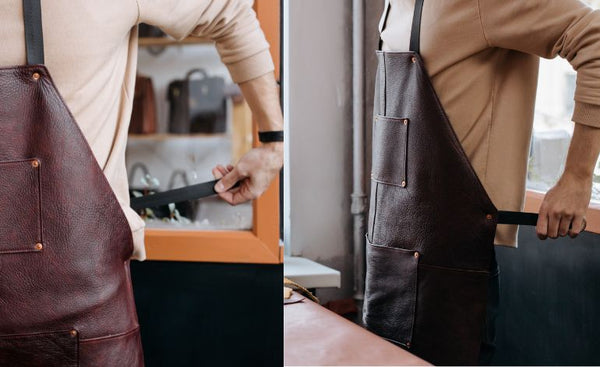
When you consider to buy leather apron, it’s crucial to consider several factors that ensure you get the utmost quality and functionality from your purchase:
Leather Thickness: The thickness of the leather determines the level of protection and durability of the apron. Thicker leather provides better resistance against sharp objects and heat. However, it’s important to find a balance between thickness and comfort, as excessively thick leather can restrict movement.
Leather Softness: While thickness is important, the softness and suppleness of the leather also play a role in comfort and maneuverability. Look for leather that is soft and pliable, allowing for ease of movement without sacrificing protection.
Break-In Time: Leather aprons, like any leather product, require a break-in period to mold to your body and become more comfortable over time. Consider the break-in time when choosing a leather apron, as some may require more wear before conforming to your body shape.
Physical Weight of Aprons: The weight of the apron can impact your comfort and mobility, especially if you’ll be wearing it for long periods. Lightweight aprons are generally more comfortable, but they may sacrifice some durability. Choose an apron that strikes a balance between weight and durability based on your specific needs.
Custom Embroidered Leather Aprons: To add a personal touch and showcase your brand or individuality, consider opting for custom embroidered leather aprons. Custom embroidery allows you to personalize your apron with your name, logo, or unique designs. It’s a great way to stand out and make a statement in your profession.
Where to Buy a Leather Apron?
Looking to purchase a leather apron? Head over to lapron and acquire finely crafted leather aprons suitable for various professions.
At our store, we offer a diverse collection of leather aprons tailored to meet the needs of different vocations. Whether you’re a bartender, welder, barber, butcher, cook, or woodworker, we have the perfect apron for you. Personalize your apron by choosing from various qualities, colors, sizes, functions, and styles.















